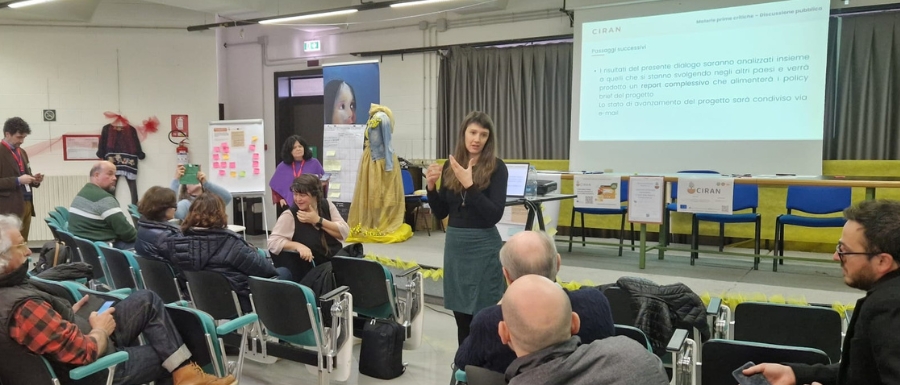On March 29, 2025, a group of citizens came together in Baiso, a small town nestled in Italy’s Apennines, to take part in a public dialogue on the future of Critical Raw Materials (CRM). Held within the framework of the CIRAN project—co-funded by the European Union—the event offered a space to reflect on how to reconcile environmental conservation with the growing economic and technological demand for CRM extraction.
The event took place at the Centro Funzionale in Baiso and was jointly organised by ALDA and Futour, with contributions from Regione Emilia-Romagna and Generator, both partners in the CIRAN project.
The day was structured into three main parts. It began with an introductory session, where participants were presented with an overview of the CIRAN project and the broader challenges associated with securing a sustainable supply of critical raw materials.
This was followed by a role-playing activity based on the “What if…?” methodology. Participants explored two fictional but plausible future scenarios—“Insular Innovation” and “Steady State”—to examine the potential consequences of different policy decisions and ways of living.
The final stage was a plenary discussion. Citizens stepped out of their imagined roles and came together to co-develop policy recommendations and reflect on what a truly sustainable strategy for CRM might look like.
Throughout the dialogue, two core questions guided the exchange: What are the key factors that underpin a sustainable supply of CRM? And should extraction be permitted in protected areas—and if so, under what conditions?
Eleven citizens took part, engaging enthusiastically in group discussions and collective decision-making. Baiso was chosen as a case study because of its proximity to protected natural areas and its location in a region known for its rich natural heritage—making it a fitting context in which to address such complex issues.
The citizens who took part showed a clear understanding of the strategic importance of critical raw materials for Europe’s future. Many stressed the value of circular economy approaches, pointing to recycling, repairability, and product durability as essential strategies for reducing dependency on new extraction.
There was a shared sense that cultural change is needed—alongside improved public education—to combat overconsumption and the pressure of marketing-driven demand.
On the sensitive issue of extraction in protected areas, participants leaned towards a case-by-case assessment. They identified several conditions that would need to be in place, including the use of low-impact technologies, mandatory environmental restoration, and compensation for the communities directly affected.
Support was also voiced for greater European strategic autonomy, with calls for strong ethical standards in CRM extraction, both within the EU and in sourcing from beyond its borders.
The insights gathered in Baiso will contribute to a broader dataset, as similar citizen dialogues are being held in other CIRAN case study countries—Portugal, Czechia, Slovakia, Ireland, and France. This comparative approach is designed to inform the development of inclusive governance models that reflect local concerns and aspirations, especially when it comes to CRM extraction in environmentally sensitive areas.
Stay informed about CIRAN’s public dialogues, research findings, and policy developments by following us online:
🌐 Project website
🔗 LinkedIn
